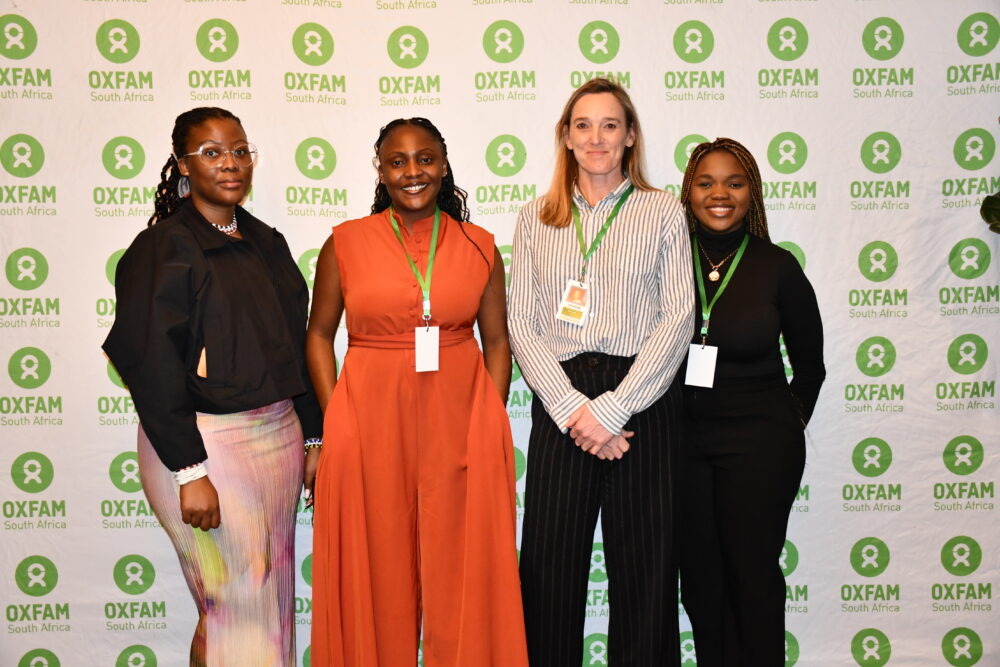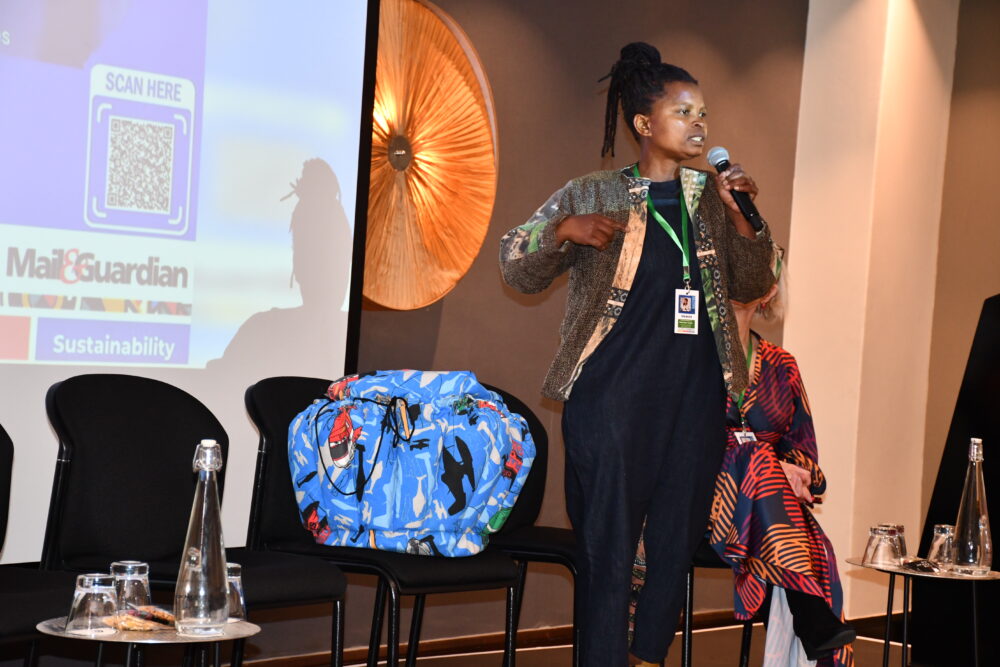Oxfam South Africa Interim ED, Ms. Nkateko
Chauke (left), with Keynote Speaker Ms.
Lebogang Mulaisi from The SA Presidential
Climate Commission.
Experts say gender inclusion is key to a sustainable energy shift in emerging economies.
As part of South Africa’s G20 discussions ahead of the leaders’ summit in November, Oxfam South Africa — in collaboration with the International Institute for Sustainable Development (IISD) and Think Tank 20 — hosted a Women’s Month event in Johannesburg focused on “powering equality” in the just energy transition.
The gathering brought together leaders in climate policy, finance, gender advocacy, and community development to answer a central question: ‘Why does gender and inclusion matter for a just energy transition in emerging economies?’
The event was hosted by award-winning broadcaster and journalist Cathy Mohlahlana, who steered conversations between experts, activists and policymakers on the structural barriers that keep women and marginalised communities out of decision-making on energy solutions.
Emphasising the critical role of women’s input, Oxfam South Africa’s acting executive director, Nkateko Chauke, opened proceedings by stressing that a just transition must be inclusive to be effective.
“If you look around this room, it is full of mostly women and that in itself says something because we need to spotlight the leadership of women in this conversation and also the leadership of marginalised communities,” said Chauke.
She said the future Oxfam envisages is one of equality, with the transition not only fair but sustainable for those most affected by climate change and energy poverty.
 The International Institute of Sustainable Development Team (Left to Right), Bathandwa Vazi,
The International Institute of Sustainable Development Team (Left to Right), Bathandwa Vazi,
Sindy Chigoli (SunCulture), Tara Laan and Kudzai Mataba
Tara Laan IISD Incentivizing Renewables Lead called attention to the global $1,5-trillion in fossil fuel support that often goes to the wealthiest, highlighting the availability of money to fund the just transition.
“We need to reallocate the vast funds that are currently allocated very inefficiently to fossil fuels to more productive purposes,” said Laan.
Sketching out a cautionary tale of the future, Lebogang Mulaisi executive manager for research and policy at the Presidential Climate Commission, asked the audience to imagine what lies ahead for South African women if the shift from fossil fuels to clean energy was not inclusive.
She told the fictional story of Naledi, a young woman growing up in 2025 during the early days of the just transition and waking in 2035 at the end of the deadline for sustainable development goals.
At 10 years old, Naledi saw a wave of promises: where the country was buzzing with new language, green jobs, climate resilience with government officials, civil society organizations, and international donors gathered in conference halls to talk about how South Africa would shift away from coal, fix energy supply, and create a better future for workers, youth, and especially women.
“Naledi is now 22 years old, and reality looks nothing like the promise. She wakes up in the dark. Another morning without electricity. The old fridge her family saved for hasn’t worked properly in years. Water only arrives every few days, sometimes not at all. In her street, unemployment is the norm,” said Mulaisi.
In Mulaisi’s scenario, young men hustle for short-term work, women manage households on too little income and feel unsafe, and the country’s energy crisis persists despite years of commitments.
“Naledi’s story is not one of failure. It’s a story about promises betrayed. And unless we get our act together with urgency and integrity, the just transition will become another chapter in a long history of missed opportunities for women like her, for women like me, and for women like you,” Mulaisi warned.
The event also brought women from other parts of the continents to share breakthroughs in innovation. From Kenya, Sindy Shigoli, head of environment, social and governance at SunCulture, highlighted agriculture’s vulnerability to climate change.
Africa has more than 700 million smallholder farmers, yet only 4% have irrigation access, she said. The remaining 96% rely on increasingly erratic rainfall.
Through solar-powered irrigation, SunCulture is working to enable year-round farming and boost food security.

The audience watched a short film documenting the work of Mamosweu Tsoabi, founder of Serapeng Sa Dithlari Environmental NPC, and her work in creating alternative energy systems at the intersection of waste reuse and community reskilling. The short film documents Tsoabi’s innovative cooking bag made from polystyrene foam and sewn with colourful designs — which Tsoabi said is able to store heat for cooking up to six hours during power cuts.
Speaking with Isabel Frye, Oxfam South Africa’s G20 senior policy adviser, at the event Tsoabi said the bags create jobs for women, reduce the need for firewood — which limits deforestation and preserve soil carbon.
“Our focus is training women how to design their own alternative energy because we know that when it comes to energy poverty, women are mostly affected because in some areas, we do not have electricity infrastructure and not everyone can access electricity,” she said.
Experts also stressed the importance of listening beyond the meeting room. Tracy Ledger, senior researcher at the Public Affairs Research Institute, said Tsoabi’s work showed why public consultation in climate policy must go deeper.
“When people say, ‘we haven’t been consulted’, they don’t mean, ‘we haven’t been in a meeting’. What they mean is, ‘we haven’t been heard’,” Ledger said, noting that frameworks often overlook women’s lived experiences which contain context-specific solutions.
A panel discussion moderated by Mohlahlana brought together voices from finance, gender policy, climate research, digital innovation and government legislature who debated various ways to close the gap between policy finance and implementation.
Linet Miriti, chief gender officer at the African Development Bank (AfDB), said policy-based lending should focus on increasing free basic electricity for poor households — a target the AfDB has yet to meet. But she highlighted successes in financing small businesses and ongoing work to develop frameworks that will make women-led projects bankable.
Bertha Chiroro, senior project coordinator at GenderCC, said energy policy remains male-dominated and often top-down, excluding women’s perspectives. She called for women’s agency in shaping solutions and a mindset shift in how inclusion for the underrepresented is approached.
Alex Benkenstein, senior climate researcher at the South African Institute for International Affairs, acknowledged the disconnect between G20 high-level discussions and the realities of those they aim to help while noting possible areas of symmetry.
“There are multiple entry points in engagement groups where women can be heard and have their views represented,” he said, but these are often underutilised.
Mmathebe Zvobwo, marketing development director at Truecaller South Africa, said the country’s G20 presidency is an opportunity, after 30 years of democracy, to address poverty and policy gaps. She pointed to challenges in data, reskilling and scaling that particularly disadvantage women, and suggested digital platforms could bridge the gap in sectors such as agroprocessing, tourism and clean energy.
Duduzile Sibiya, provincial climate coordinator for Mpumalanga’s agriculture and environment department, said the province — home to 83% of the country’s coal mining and 87% of its electricity generation — is at the centre of the transition.
She pointed to green innovation solutions emerging in Komati village after the closure of a coal-fired plant, and urged audience members to coordinate advocacy across organisations for greater impact.
Closing the event, Frye said she hoped the dialogue would become a catalyst for change and an opportunity for new models of development.
“The aim of today was not to hear the problems, it was to recognise the challenges and to bring the solutions to bear, so we hope that those have come through,” she said.
The women gathered at the event shared a common vision of a future where they were not only included but took the lead in deciding the fate of their lives underscored by a vision of solidarity, equality and sustainability.